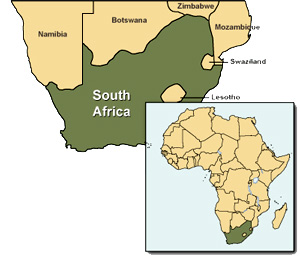ANC targeting 139 South African farms for expropriation, without compensation
By Jehron Muhammad | Last updated: Aug 15, 2018 - 12:17:23 PMWhat's your opinion on this article?

|
The question of land reform was brought forward in a motion by Julius Malema, leader of South Africa’s leftist Economic Freedom Fighters party.
Opening the debate in Parliament, Malema said, “The time for reconciliation is over. Now is the time for justice.”
According to express.co.uk, Malema does not want to take revenge on Whites, but wants to restore Blacks to the dignity he believes is deeply rooted in the land.

|
The Wall Street Journal’s editorial board sees the land reform issue as misdirected. The Journal recently took South African President Cyril Ramaphosa to task, calling his future transfer of land to Black South Africans “snatching private property.” A WSJ editorial declared, “(This) is about as destructive a policy as there is.”
Using suspicious numbers from the so-called White “liberal” founded and White funded South African Institute of Race Relations, founded in 1929, the WSJ estimates that Black South Africans control 30 percent to 50 percent of the country’s land. In addition, the Rupert Murdoch-owned publication claimed “Mandela insisted that land reform is best achieved through a ‘willing buyer, willing seller’ principle, as it is in other democracies with a strong rule of law.”
The actual land redistribution program that said 30 percent of the agricultural land was to be transferred from White farmers to Blacks within the first five years of South Africa’s new democracy was proposed by the World Bank. By the end of 1999 barely 1 percent of the land had been transferred from White to Black hands. And by 2014 not even 7 percent of agricultural land was in Black hands. Described in 2014 and now 2018, the program is said to be a “dismal failure.”
The ruling African National Congress is targeting 139 selected farms that it plans on expropriating without compensation.
The City Press reported that the ANC’s National Executive Committee (NEC) has ruled that the Department of Rural Development and Land Affairs should forge ahead with the process at the Land Claims Court, in which the state will for the first time refuse to pay market value for identifi ed land portions in various parts of the country.
One thing those critical of land reform refuse to do is recount the history of land expropriation, as mentioned in 2015, at the Mandela anniversary speech given by French economist Thomas Piketty.
In Sol T. Plaatje’s 1916 book, “Native Life In South Africa,” the author chronicles events after implementation of the 1913 Native Land Act.
The Act institutionalized exploitation of South Africa’s native population similar to the American system of exploitation called sharecropping that grew out of the need for former slave masters to exploit the labor of their recently freed slaves.
“There were two reasons for the introduction of the Natives’ Land Act: Black farmers were proving to be too competitively successful as against White farming and there was a demand for a flow of cheap labor to the gold mines.”
In South Africa not only were Black farmers forced off of the land of their ancestors, if they stayed they were required to labor exclusively for their new masters. Before the new law, Blacks paid 50 percent of their harvest for the right to live on the land. Afterward they could no longer benefi t from the cattle they owned since the law said livestock was now under the control of the White land owner.
In a recent study, published by the national data agency Statistics, South Africa, “Poverty trends in South Africa: An examination of absolute poverty between 2006 and 2015” revealed a startling increase in poverty rates for post-apartheid Black South Africa.
According to the study, Black South Africans are the worst affected by rising poverty, with half the population listed below Statistics South Africa’s lower-bound line of poverty, defi ned as “individuals who have to sacrifi ce buying food for other essentials.” Less than one percent of White South Africans are below this poverty line.
One reason for the high rate of Blacks living in abject poverty is their alienation from agriculture. Essy Letxoalo, author of Land Reform in South Africa, writes, “This alienation is the result of land dispossession and it is now used in anti-land reform proposals, which have been silent on the fact that these people do not have skills for urban jobs; and that the South African economy does not have the capacity to absorb the prematurely displaced laborer.”
During Piketty’s 2015 speech, the author of the bestselling book “Capital in the 21st Century” argued capitalism today is fundamentally flawed wealth and will always grow faster than economic output. In other words, the rich will get richer and the poor will get poorer.
“If we take a broad international historical perspective, we see in many countries, in history, much more ambitious land reforms than what we have seen in South Africa since the end of apartheid. I think it’s fair to say that Black economic empowerment (BEE) strategies, which were mostly based on voluntary market transactions, were not that successful in spreading wealth. So, I think we need to think again about more ambitious land reform,” he said.
Follow @jehronmuhammad on Twitter
INSIDE STORIES AND REVIEWS
-
-
About Harriett ... and the Negro Hollywood Road Show
By Rabiah Muhammad, Guest Columnist » Full Story -
Skepticism greets Jay-Z, NFL talk of inspiring change
By Bryan 18X Crawford and Richard B. Muhammad The Final Call Newspaper @TheFinalCall » Full Story -
The painful problem of Black girls and suicide
By Charlene Muhammad -National Correspondent- » Full Story -
Exploitation of Innocence - Report: Perceptions, policies hurting Black girls
By Charlene Muhammad -National Correspondent- » Full Story -
Big Ballin: Big ideas fuel a father’s Big Baller Brand and brash business sense
By Bryan Crawford -Contributing Writer- » Full Story






 Click Here Stay Connected!
Click Here Stay Connected!








